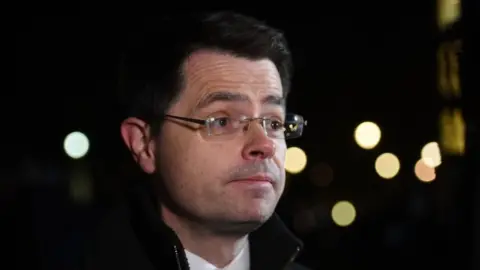Government still committed to net migration target - Brokenshire
 PA
PAThe government's target of reducing net migration to less than 100,000 a year has been left out of draft proposals for a new immigration system.
But Communities Secretary James Brokenshire said the government remained committed to the target.
He said the aim was to get net migration down to "sustainable" levels.
The final version of the much-delayed immigration plan, which aims to end free movement from the EU after Brexit, has yet to be agreed.
Ministers had insisted it would be issued this week, before the Christmas break, but it is unclear if that will now happen as officials work round the clock to finalise the plans.
The goal of cutting net migration - the difference between the number of people entering and leaving the country - was introduced by David Cameron in 2011 and was a Conservative manifesto commitment at last year's general election.
The BBC's Home Affairs correspondent Danny Shaw said removing it from the immigration white paper would be a "hugely symbolic step".
The government has never come close to meeting the target and has faced repeated calls to drop it.
The number of EU citizens moving to the UK has fallen since Britain voted to leave the EU, but more people coming from elsewhere means the overall migration rate is unchanged and stands at 273,000 a year.
Home Secretary Sajid Javid will reportedly use the immigration white paper to set out plans to cut net migration from the EU by as much as 80%.
He wants to limit the number of low and medium-skilled workers coming to the UK from EU countries by saying they must earn at least £30,000 a year.
But there will be no cap on the number of highly skilled workers, reports suggest.
 PA
PAThis will create a level playing field with immigration from outside the EU, the government says.
But some businesses have warned of labour shortages, and Chancellor Philip Hammond and Business Secretary Greg Clark are arguing for the proposed £30,000 minimum salary for low-skilled workers to be reduced, according to The Daily Mail.

Why 'net migration'?
By Political Reporter Brian Wheeler
The Conservatives went into the 2010 general election with a pledge to return to the "sustainable" levels of net migration seen in the 1990s. David Cameron promised to meet the target "no ifs, no buts".
But the idea has always had its critics. A country can only control how many people come in, not how many emigrate. And Mr Cameron only had limited control over those coming in anyway, because of EU free movement rules.
But focusing on net migration did shift attention away from the far higher immigration figure - 630,000 in 2017 - which had previously dominated the headlines.

Communities Secretary James Brokenshire refused to speculate on the contents of the draft white paper, which have been shown to the cabinet for the first time this week.
He told BBC Radio 4's Today programme: "We are committed to seeing net migration reduced to those sustainable numbers that we saw back before 1998 when it was less than 100,000."
He said the government had focused on that number "because that is what is sustainable in the long-term".
Global employment consultancy Mercer has predicted a UK workforce shortage of 1.9 million by 2025, if the government remains committed to its 100,000 target and demand for labour continues to rise at the same rate as it has for the past 10 years.
But the company claims there is an "untapped" workforce of 1.8 million UK-born workers, if firms started recruiting more workers aged over 50, women, and people with disabilities.
